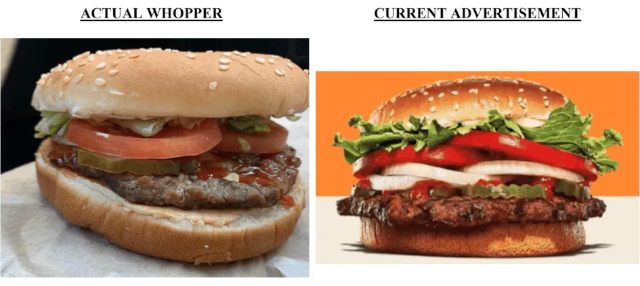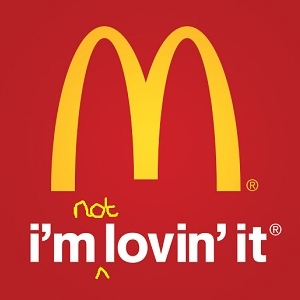We’re all well aware that the burgers we get at our fave Fast Food outlet rarely if ever looks like the ones in the ads the brand used to get us into the store. There’s even at least one website dedicated to side-by-side comparisons. But now, after decades of complacency, folks are demanding compensation…
 Evidence photos in the Coleman vs. Burger King case: Note the difference in size of the
Evidence photos in the Coleman vs. Burger King case: Note the difference in size of the
patties. Note also the relative abundance of toppings in the glossy ad photo (right).
It started back in April of this year, when Burger King was slapped with a lawsuit claiming is ‘overstated’ its flagship Whopper burger in current advertising. Coleman vs. Burger King alleges that, “Burger King advertises its burgers as large burgers compared to competitors and containing oversized meat patties and ingredients that overflow over the bun to make it appear that the burgers are approximately 35 percent larger in size, and contain more than double the meat than the actual burger.”
In legal terms, BK is accused of breach of contract, negligent misrepresentation, unjust enrichment, and violation of Florida’s consumer protection law. They’re also demanding that BK discontinue its allegedly deceptive advertising.
But that was just the beginning
Earlier this week, Fast Food lover Justin Chimienti filed similar suits in New York against both McDonald’s and Wendy’s, claiming those brands also show patties in their ads that are ‘materially’ larger than those customers actually receive. Why? The restos use under-cooked patties in their ads, the Chimienti suit claims. Fully cooked patties would be 25 percent smaller due to shrinkage during grilling.
And a food stylist (yes, there is such a job description) who has worked for both McDonald’s and Burger King, prepping their products for the advertising glam shots, is quoted as confirming that. She also said she prefers using under-cooked patties because fully-cooked burgers look ‘less appetizing’ to the camera.
Why the uproar now?
“Defendants’ actions are especially concerning now that inflation, food, and meat prices are very high and many consumers, especially lower income consumers, are struggling financially,” the Chimienti complaint says. That’s a pretty broad hint that folks are getting antsy about some issues they may have simply considered ‘little white lies’ in more affluent times.
Neither McD’s or Wendy’s responded to requests for comment from Reuters reporter Jonathan Stemple. Burger King officials have also declined to comment.
But in an April conference call with investment analysts, McDonald’s Chief Executive Chris Kempczinski did admit that lower income consumers are probably feeling, “increased value sensitivity,” as inflation and the war in Ukraine drive up food, energy and housing costs.
And Wendy’s CEO Todd Penegor told analysts earlier this month that, “inflation is being noticed by the consumers.”
My take
In case it wasn’t clear, that remark about consumers, “getting antsy about some issues they may have simply considered ‘little white lies’ in more affluent times,” was my personal observation. But it’s nice to see people at the top of the business agreeing with me!
Another thing: This is not the first time, by a long reach, that fast food giants have been taken to task for ‘overstating’ their products in ads.
Back in 2016, Business Insider published a compendium of ’18 false advertising scandals that cost some brands millions’.
The Government of Canada Competition Bureau maintains a website listing common sense ‘Advertising DOs and DON’Ts‘.
The U.S. Federal Trade Commission has archived a fascinating 1996 speech by former Commissioner Roscoe B. Starek, III to the National Infomercial Marketing Association about, “some of the myths and half-truths that come up time and time again in our enforcement actions.”
And good, old Wikipedia offers a comprehensive clinical look at ‘False Advertising’.
We’ll update you on all these current Fast Food sector deceptive advertising lawsuits as further developments take place…
~ Maggie J.

